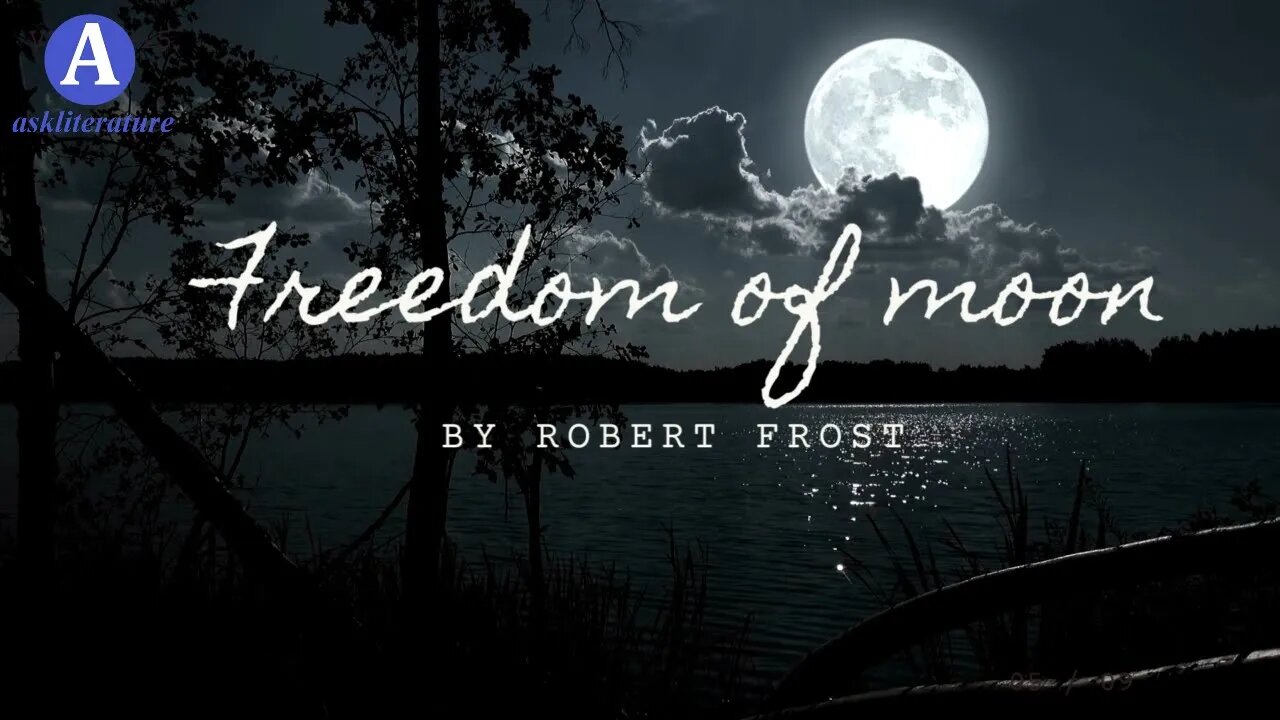Premium Only Content

The Freedom of the Moon by Robert Frost Analysis
"The Freedom of the Moon" by Robert Frost is a short and contemplative poem that explores the contrast between two celestial bodies: the Earth and the Moon. The poem begins by describing the Moon as "immaculate," suggesting its purity and freedom from the turmoil and imperfections of earthly life. The Moon seems to be an ethereal being that can observe the Earth from a distance.
The speaker compares the Moon's tranquility to the Earth's state of chaos, where "the world has burned the wires." This line may allude to human technological advancements and their negative consequences. While the Moon appears to be free and untethered, the Earth is entangled in its own creations and desires.
In the final lines, the poem suggests that the Moon's freedom might be an illusion, as it is "full of our own emptiness." This paradoxical statement hints at the Moon's symbolic connection to human longing and desire, making it just as entangled as the Earth, albeit in a different way.
Themes.
Freedom and Confinement. The poem explores the idea of freedom, contrasting the perceived freedom of the Moon with the confinement and entanglement of the Earth. However, it also suggests that both entities are bound in some form of limitation, presenting a nuanced perspective on freedom.
Nature versus Civilization. The poem juxtaposes the natural purity of the Moon with the complexities of human civilization on Earth, highlighting the tensions between the pristine and the artificial.
Longing and Desire. The Moon symbolizes human longing and desire, suggesting that even the celestial body seemingly untethered by human struggles carries its own form of emptiness and attachment.
Symbols.
The Moon symbolizes freedom, purity, and distance from earthly concerns. It also represents human longing and desire.
The Earth symbolizes the world of human civilization, its chaos, and the consequences of human actions and advancements.
Wires represents the technological entanglements of the modern world, possibly symbolizing the negative impact of human inventions and industrialization.
Literary Devices.
Imagery. The poem employs vivid imagery to contrast the Moon's serenity with the chaos of the Earth and its technological consequences.
Metaphor. The Moon serves as a metaphor for various themes, including freedom, purity, and human longing.
Paradox. The line "full of our own emptiness" presents a paradox, suggesting that the Moon's freedom is an illusion and that it, too, is affected by human emotions and desires.
-
 LIVE
LIVE
Game On!
15 hours ago $3.86 earnedNFL Week 14 Wiseguy Roundtable BEST BETS!
7,533 watching -
 LIVE
LIVE
Joe Donuts Live
3 hours agoA New Journey Into Alan Wake’s Dark and Twisted World
107 watching -
 LIVE
LIVE
Boxin
1 hour agoStarting Tomb Raider 2 remastered!
610 watching -
 10:47
10:47
stateofdaniel
1 day agoHouse Dem Claims ICE Pepper Sprayed Her in the Face, BUT the Video Tells a Different Story
1.43K23 -
 LIVE
LIVE
Pickleball Now
2 hours agoLive: IPBL 2025 Day 7 | Electric All-Star Battle & Epic Hyderabad Royals vs Mumbai Smashers Final!
319 watching -
 9:29
9:29
Sideserf Cake Studio
20 hours ago $5.52 earnedHyperrealistic CAKE of a Nostalgic Christmas Decoration!
56.1K9 -
 41:54
41:54
American Thought Leaders
16 hours agoHere’s the Real Problem for America’s Middle Class | Robert Kiyosaki
14.4K5 -
 27:56
27:56
Degenerate Plays
22 hours ago $3.59 earnedDiagnosed From My Sonic The Hedgehog Fixation? - Batman: Arkham Asylum : Part 17
12.8K -
 1:31
1:31
Damon Imani
3 days agoWhoopi TRASHED Kash Patel’s FBI and Got Calmly DESTROYED by Damon!
14.2K18 -
 2:06
2:06
Memology 101
11 hours ago $1.76 earnedWON'T SOMEBODY PLEASE THINK OF THE POOR NARCOTERRORINOS?!
14.3K13